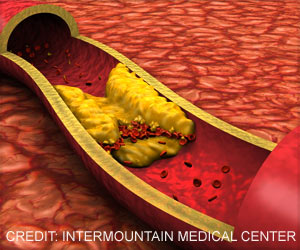A new study by researchers at the University of Cincinnati suggests that experiencing brief periods of blocked blood flow may condition a person to survive a full-blown heart attack later.
A new study by researchers at the University of Cincinnati suggests that experiencing brief periods of blocked blood flow may condition a person to survive a full-blown heart attack later.
The five-year laboratory study showed that experiencing short periods of stress, either from reduced blood flow or high blood pressure, activates a protective molecular pathway in the heart called JAK-STAT, which protects the heart muscle.Dr. Karyn Butler, a surgeon-scientist at the university, says that the JAK-STAT pathway can help precondition and protect the heart from damage caused when blood flow is restored after a period of decreased flow, as occurs after a heart attack.
“These mini stress tests appear to push the heart muscle into an adaptive state where it gets used to how long-term stress feels. This preconditioning helps the heart muscle better tolerate longer episodes of compromised blood flow,” she said.
Writing about the findings in the American Journal of Physiology: Heart and Circulatory Physiology, the researcher revealed that she wasted to determine how she could help patients with heart disease from high blood pressure tolerate cardiac ischemia, which occurs when vessels become narrowed or blocked and results in a dangerous reduction of blood flow to the heart.
With a view to studying the heart’s response to restored blood flow after cardiac ischemia and in the presence of hypertension, Butler developed a hypertrophied (enlarged) animal heart model to mimic the conditions of heart enlargement and congestive heart failure in humans.
The enlarged heart model was then made to experience a series of short periods of blood flow blockage, in order to see what happens in humans with serious heart disease.
Advertisement
“The concept is similar to how we approach a new physical fitness regimen: incremental steps. You wouldn’t try to condition yourself for a marathon by running 10 miles on your first day of training. You’d prepare yourself incrementally,” said Butler.
Advertisement
Butler said that revealing the underlying molecular mechanisms might enable scientists to develop drugs that could harness the protective benefits of the JAK-STAT pathway selectively, and help patients avoid debilitating heart injuries.
She is now planning to compare the effects of the JAK-STAT pathway between normal hearts and diseased hearts, similar to those of patients at a higher risk of heart attack.
Source-ANI
LIN/P










